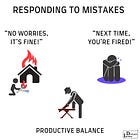Staying Calm When You Want to Disappear
The framework that helped me keep calm in high-pressure situations.
Have you ever felt attacked by a question? Someone in authority demanding answers, or an engineer challenging your decisions?
What did you do after that?
Blabber defensive words? Attach back? Make a decision prematurely?
When I feel scared in such situations, I use the BAA framework, which has helped me resist the pressure over the years.
Today I’m going to cover 3 real situations to help you understand how the framework works.
The first time I encountered each I messed up badly - instead of Breath, Assess, and Act I followed Act, Assess, and Regret… :)
Today’s article is a guest post by
, Staff Engineer at Meta and the writer of , where he shares stories from his successful Big Tech career!😳 1. A Grilling Leadership Review
Picture this: You're presenting to leadership, feeling confident. Suddenly, a VP interrogates you with an unexpected question:
“Why aren’t you building Feature X? Why are you focused on Feature Y?”.
A long time back, everyone had agreed that Feature X wasn’t necessary. So, this question stumps you. Gulp. 😳
It's natural to feel your heart racing and palms sweating. You weren’t ready for this from someone with authority.
You feel fear because
You don’t want to give a ‘less than ideal’ answer to your VP
You wonder if you missed a memo about Feature X
You fear saying “NO” to your VP.
What you shouldn’t do
Start blabbering and giving non-answers.
Make promises (without thinking over) that you will work on Feature X.
What you should do
Breath
Take a deep breath and let the feeling pass. For a moment, forget it’s a person with a big title!
Assess
Ask yourself -
Do you understand the question and the intent?
Is there a baked-in assumption in the question that does not align with yours?
For example, you assume Feature X is not prioritized, but your VP may have a different assumption.
Do you hesitate to give a direct response? If so, ask why.
Do you assume the answer may make them unhappy?
Act
Don’t let their tone scare you or let your hesitation overpower your response.
In this case, you want to start with a clear answer and share your justification. The justification may be as simple as, “Feature X was deemed unnecessary in the previous review, and Feature Y adds the most value based on the user study”.
You should add, “Do you believe we should consider Feature X again?” This way, you can let them chime in if they have new data points.
The more you practice, the more comfortable you get. VPs appreciate that!
😱 2. Crazy Outage
Your phone's buzzing like crazy. There's a major outage, and your team can't find the root cause. 😱
A bunch of super senior engineers and managers are waiting for you to fix it! These high expectations in an unknown situation can scare you into - trying random fixes and potentially making things worse.
You feel the fear because you think:
You are the team leader, so you are “supposed” to have the answers!
If you don’t fix the problem, those super-senior engineers may think you know nothing. So, everyone will know you are an imposter!
Acting rashly will surely hamper your reputation. So, take a moment.
What you should do
Breath
Take a deep breath and spend a minute understanding the symptoms. Let people know you need a minute to gather context. If someone is being pushy, let them know you will respond soon.
Assess
Make a mental note of things you understand vs not. Specifically,
Do you understand the symptoms and the impact?
Do you understand the trigger?
Do you understand potential issues that have been ruled out or the potential theories?
Act
This may be a complex outage with an unclear root cause. Clearly communicate what you know vs. what you don't. Share the potential theories you and your team will validate. If you need help from a specific team, then ask for it. Engineers from other teams want to help, but you must ask for it.
Share regular updates so that they are not left guessing. Even if it’ll distract you for 5 crucial minutes, those updates are critical, and will give you breathing room to work in quiet.
🧐 3. Unexpected Critical Feedback
You’ve just wrapped up a project, and expect praise for your leadership. Instead, you hear, "You didn’t communicate well during the project." Suddenly, your confidence takes a hit. 😳
You feel fear because
You thought you did well, and now doubt creeps in.
You’re worried this might impact your promotion.
What you should not do
Reject the feedback right away
Accept it without understanding the specifics
What you should do
Breath
Listening to critical feedback is never easy, especially when it comes as a surprise. So, take a moment.
Assess
Ask yourself -
Do you know if the feedback is true?
Do you understand the specific instance that this feedback refers to?
Do you feel uncomfortable talking about this now?
Act
Respond with something like, “Oh! This is a surprise, but I want to understand the specifics. ” If the feedback was raised during a meeting with multiple people, you can also add: “Can I schedule a quick 1:1 with you later today?”.
This signals to the feedback giver that you are listening and relaxes them. It also gives you more time to reflect on it!
Anton here - thanks
for a great article and a very useful framework!Those 10 seconds of stopping and breathing can do wonders. Without knowing it, I was using the same framework for years. I even wrote about one such stressful experience:
For more articles by Raviraj, check out his newsletter:
What I enjoyed reading this week
AI companies hit a scaling wall by Casey Newton
Why Developers Need to Build Their Own IKEA Furniture by Matt Watson
Product manager is an unfair role. So work unfairly by Tal Raviv in
. This one is 100% relevant for engineering managers too!








Useful but not necessarily applicable in real life for some....no matter how much you read about tackling these moments you need to experience them, and fail, and thats ok.... But learn from it....